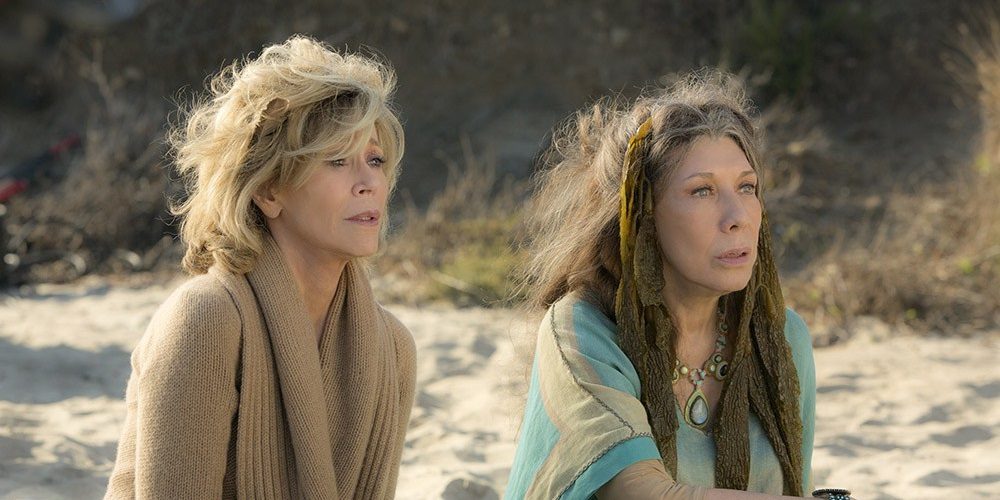Netflix’s original sitcom, Grace and Frankie, has always had a strange appeal for me. As a millennial watching a show starring four septuagenarians, I have always been acutely aware that I am not the target audience. That said, the show’s delightful combination of perfect casting and good-natured humor has never failed to suck me in, and the fourth season, which premiered on January 19th, is no exception.
For those not in the know, Grace and Frankie is the story of the two wives (Jane Fonda, Lily Tomlin) left behind when their respective husbands of 40 years announce they are gay and have been secret lovers the whole time. Their golden years now in disarray, Frankie and Grace become unlikely roommates, bonding over their shared misfortune. Husbands, Sol and Robert (Sam Waterston, Martin Sheen), explore their new lives in the open while the couples’ four adult children drift in and out of their parents’ tumultuous daily shenanigans.
Where past seasons explored mismatched pairs, second chances, and the pain of starting over at 70, the main theme of season four seemed to the surprising repercussions of aging. At the start of the season, Sol and Robert realize they are getting too old to participate in the daily protests into which they have thrown their hearts and souls. By the end of the season, they arrive at a new epiphany: that they have missed out on an entire complex culture by hiding who they were for so long; they are now adrift and struggling to find their place in the gay community they hid from for so long.
Frankie and Grace’s journeys this season are a little more direct: after returning from Santa Fe because she just cannot be away from her family, Frankie reclaims her place in the beach house from a younger tenant whom Grace has installed in the house. Meanwhile, Grace struggles with insecurity when she dates a younger man whose infatuation with her is something Grace cannot wrap her head around.
One episode in particular stood out to me: “The Landline”, which explores the existential ennui experienced by 70-year-olds when their friends all start dying from natural causes and they realize that this is now the norm. “Do you remember our first funeral together?” Robert asks while driving Grace to the service for their latest acquaintance to pass. “Your aunt Gwen?” Grace asks, but Robert is actually referring to their daughter’s hamster, Stud. “Stud…” Grace says with sudden remembrance. “Am I a terrible person that I… I felt more emotional with Stud’s passing than I do with Mary’s?” she asks Robert, before going on to explain that she liked Mary, but she feels nothing. “I think you’re just becoming numb from going to so many of these,” Robert explains, and Grace realizes this is true. She has never been a person given to sentiment to begin with; the barrage of emotions from back to back funerals is too much for Grace to deal with so she checks out. Even still, a surprise passing manages to catch her off guard and forces Grace to reevaluate her own mortality in one of the most memorable scenes of the season.
There is more evidence of the theme throughout: a younger friend starts to show signs of Alzheimer’s; Frankie’s forgetful whimsy has not only caused her to be labeled deceased by the government, but later leads to an awkward incident with one of her sons; Grace needs knee surgery and she goes to extreme lengths to hide it from her family and boyfriend; in a moment of weakness, Grace’s poor judgment leads to a much bigger problem they can no longer hide from their children. All of these issues culminate in a mild cliffhanger that will probably be resolved early in season five, which was announced February 1st.
The children also experience big changes this season as they move on with their lives. It was a good season for Bud (Baron Vaughn), who celebrated the birth of his first child, and Coyote (Ethan Embry), whose relationship moved to the next level (tragically, this was about the extent of Coyote’s development this season). Grace and Robert’s daughters had a harder time this season, with Brianna (June Diane Raphael) struggling to keep her company afloat after some bad business calls and Mallory (Brooklyn Decker) searching for some purpose to distract her from her failed marriage. I found it interesting that, in a complete flip from season one, Mallory is the character lost and alone, whereas the other three offspring are all in successful, supportive relationships. I haven’t warmed to Bud and Coyote’s girlfriends, but Brianna’s boyfriend, Barry, continues to be a delightful addition and Brianna herself holds the position of MVP for me (I’m declaring June Diane Raphael a national treasure). I don’t know what the future is for Grace and Frankie’s children, but I hope they all stick around, because the show would be missing something special if any of them were to leave.
Grace and Frankie has always excelled at presenting family dynamics; these are characters who love each other and will always be a family, no matter what. Season four was another successful 13-episode run and I look forward to seeing what lies ahead for each and every one of these characters.








